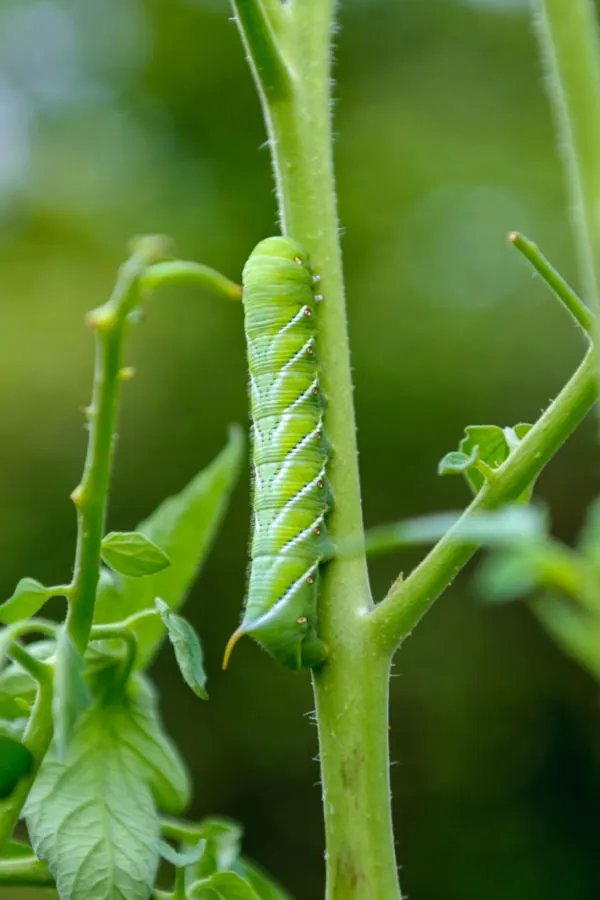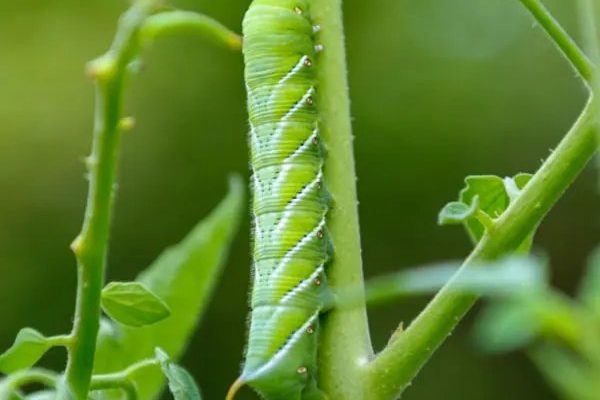
Hornworms, specifically the **tomato hornworm**, are notorious for munching on tomato plants, but they don’t have to ruin your gardening dreams. By choosing the right companions for your plants, you can naturally deter these little green monsters and create a thriving garden ecosystem. Let’s explore some effective companion planting strategies to help you enjoy your garden to the fullest while keeping hornworms at bay.
Understanding Hornworms
To tackle the issue of hornworms, you first need to know what you’re dealing with. Tomatillo hornworms, which turn into beautiful moths, start as small caterpillars that can grow quite large. They’re often green with a horn-like projection on their rear end, making them somewhat intimidating. You might be wondering where they come from. Well, they usually show up when you have tomatoes, peppers, or eggplants in your garden, as these are their favorite snacks.
When hornworms invade your plants, they can strip leaves in no time, leaving you with sad, wilting plants. If you don’t catch them early, they can do serious damage, which is why quick action is crucial. Identifying them can be easy—if you see leaves disappearing, peek underneath the foliage. The hornworms tend to hide during the day, so a little exploration goes a long way.
While hornworms may seem tough to handle, they have natural enemies in the garden. Birds, parasitic wasps, and even certain plants can help control their population. Understanding their lifecycle and how they fit into the eco-balance of your garden can give you a strategic advantage.
Companion Planting Basics
So, what exactly is companion planting? It’s all about pairing plants that help each other thrive. Think of it as planting a buddy system; certain plants can repel pests, attract beneficial insects, or improve soil health. The idea is to create a harmonious environment where plants can support each other.
Here are a few key benefits of companion planting:
- Pest Control: Some plants naturally deter pests like hornworms, protecting your precious veggies.
- Enhanced Growth: Certain combinations can improve nutrient uptake and growth rates.
- Soil Health: Some plants can improve soil quality, benefiting their neighbors.
For example, marigolds are often planted alongside tomatoes because they help to repel nematodes and other unwanted pests. Meanwhile, basil is said to improve the flavor of tomatoes while keeping hornworms away. By planning your garden carefully, you can harness these benefits to your advantage.
Effective Plant Combinations
When it comes to pairing plants to combat hornworms, some combinations stand out. Here are a few effective duos you might want to try in your garden:
1. Tomatoes and Basil
Basil is not just a delicious herb; it’s also a fantastic companion for tomatoes. The aromatic oils in basil can help mask the scent of tomatoes, making it harder for hornworms and other pests to find them. Moreover, basil can also attract pollinators, improving tomato yields.
2. Tomatoes and Marigolds
As mentioned earlier, marigolds are known for their pest-repelling properties. They produce a compound that can deter many garden pests, including the hornworm’s moth parent. Planting marigolds throughout your tomato patch creates a protective barrier that hornworms might think twice about crossing.
3. Tomatoes and Borage
Borage is another excellent companion for tomatoes. This herb not only attracts beneficial insects like bees and predatory wasps, but it also helps improve soil health. It’s said that borage can even enhance the growth and flavor of tomatoes, making it a win-win!
Plants to Avoid with Tomatoes
Just as there are great companion plants, some plants can be detrimental when planted near tomatoes. Here are a few you’ll want to avoid:
- Cabbage: Members of the cabbage family can attract the same pests, including hornworms.
- Potatoes: Both plants belong to the nightshade family and can compete for nutrients and space.
- Fennel: This herb can inhibit tomato growth and may attract unwanted pests.
Keeping these plants away from your tomato patch can help reduce stress on your plants and keep hornworms from multiplying in your garden.
Natural Predators and Beneficial Insects
While companion planting can do a lot to keep hornworms at bay, adding natural predators to your garden is another smart move. Birds, especially, can be your best friends. They love munching on hornworms and other pesky insects.
You might also consider introducing beneficial insects like **ladybugs** or **parasitic wasps**, which can help control hornworm populations. These little champions will munch on eggs or larvae, keeping numbers in check.
Creating a welcoming environment for these creatures can make a big difference. Planting flowers that attract them or providing water sources can help keep their populations thriving.
Maintaining Your Companion Garden
Once you’ve set up your companion planting scheme, it’s essential to maintain it. Regularly check your plants for signs of hornworms, like holes in the leaves or droppings on the ground. You can handpick any hornworms you see, but be sure to check the undersides of leaves where they like to hide.
You’ll also want to ensure your companions are getting the right amount of nutrients and water. A balanced approach will help all your plants thrive together. If you notice any plants struggling, it might be worth adjusting their care or even relocating them to a sunnier spot.
Lastly, keep in mind that some plants may need to be rotated each season. Changing up the arrangement can prevent pest build-up and keep your plants healthier.
Dealing with hornworms might feel overwhelming at first, but understanding companion planting can turn your garden into a thriving, pest-resistant oasis. By pairing plants wisely and inviting beneficial insects into your space, you can create a friendly atmosphere that helps your plants grow strong and healthy.
Whether you’re planting tomatoes, peppers, or other veggies, integrating these strategies will give you the upper hand against hornworms. Remember, it’s all about creating balance and harmony in your garden. So grab your gardening gloves, and let’s get planting!

